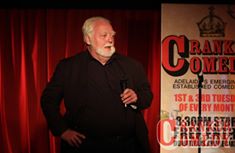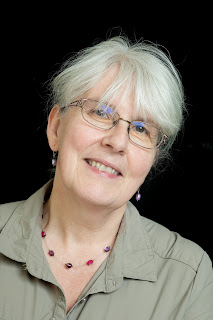What do you write? Why this in particular?
I used to write mostly poetry, much of that for special occasions for friends and family. Now I concentrate on short stories, flash fiction and microfiction and the occasional creative non-fiction piece.. I don't seem to have ideas that will sustain a novella or a novel but that could simply be me being lazy and/or easily bored.
I also do a bit of stand-up comedy occasionally.
What got you started on writing in the first place?
I've dabbled on and off, starting with the usual dreadful teenage angst stuff, then the social injustice phase of my twenties and thirties.
It's only since I've retired from paid work that the concentration and energy needed to write regularly and share my work has kicked in.
Do you have a particular routine?
Not really, although I find I do my best work in the morning. That said, I'm a poor sleeper so many of my ideas are generated at odd times during the night.
Do you have a dedicated working space?
Yes. My wife and I are empty nesters so I have an office that becomes a spare bedroom when family visits.
When did you decide you could call yourself a writer? Do you do that in fact?
I do sometimes call myself a lower case writer. I think I'd only change that to an upper case W if my work was picked up by a commercial publishing house and it sold more than 1000 copies to complete strangers.
How supportive are your friends and family? Do they understand what you're doing?
My wife, Sue, is my greatest supporter (if not always the biggest fan of some of my darker work). Most of my friends and family don't live in worlds where writing is valued and read. Wishing me the best in doing what makes me happy and Facebook likes are about the limit. To me the sincerest form of both flattery and support is buying someone's book, even if you never read all of it or any of it. Most people don't think of paying little more than the cost of a coffee as a token of their support for your chosen path or they expect a freebie because they know me.
That said, I gain enormous support and learn a lot from followers of two word prompt sites I contribute to regularly: Six Sentence Story GirlieOnTheEdge's Blog – Words of a clarklike female (wordpress.com) and Carrot Ranch's weekly 99-word challenge Challenge Rules « Carrot Ranch Literary Community .
What are you most proud of in your writing?
When a description or a character or a witticism hits the mark with my readers in the way I intended it is always a cause for celebration.
How do you get on with editing and research?
To my detriment, I have to be dragged kicking and screaming to editing. However research is an addiction and it will often take me down rabbit holes far removed from the original subject, for better or worse. I think if you are setting a story in a real environment (as distinct from fantasy, surreality, sci-fi etc) you owe it to your readers to make it plausible and historically accurate.
Do you have any goals for the future?
Apart from waking up tomorrow, my plans are few and far between, as my peripatetic life testifies. The most planned aspects of my life these days are our veg garden and next week's menu as the chief cook of the household. On the latter, I only have about another 70 years to go to even the balance with the women in my life.
Our youngest grandson bringing in his diggers to help Grandpa with the garden.
Which writers have inspired you?
John Steinbeck, Sinclair Lewis, George Orwell, Graham Greene, Joyce Carol Oates, Barbara Kingsolver, John Updike, Peter Goldsworthy*, Gail Jones*, Tim Winton*, Alex Miller*, and The Goons, to name but a few.
*Australians







